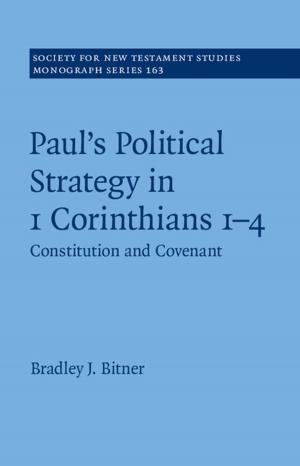World Literature and the Geographies of Resistance
Fiction & Literature, Literary Theory & Criticism, American| Author: | Joel Nickels | ISBN: | 9781108660471 |
| Publisher: | Cambridge University Press | Publication: | May 31, 2018 |
| Imprint: | Cambridge University Press | Language: | English |
| Author: | Joel Nickels |
| ISBN: | 9781108660471 |
| Publisher: | Cambridge University Press |
| Publication: | May 31, 2018 |
| Imprint: | Cambridge University Press |
| Language: | English |
This book proposes a new definition of world literature: an archive of democratic mechanisms external to state power. Accordingly, World Literature and the Geographies of Resistance takes shape as an exploration of nonstate space - territories of self-government that contest the vertical command structures of the state. Joel Nickels argues that literature devoted to these processes of spatial occuption can help us imagine democratic alternatives to state space and to the regime of legalized dispossession that goes under the name of globalization. Conceptualized in these terms, world literature can be viewed not as the corollary of 90s-era cosmopolitanism, but as a document of strategies for the militant reorganization of social space. This ambitious book addresses the work of Patrick Chamoiseau, Ousmane Sembene, Miguel Ángel Asturias, Claude McKay, Arundhati Roy, T. S. Eliot and Melvin Tolson. It engages with theories of transnationality, diaspora and postcoloniality, as well as world literature.
This book proposes a new definition of world literature: an archive of democratic mechanisms external to state power. Accordingly, World Literature and the Geographies of Resistance takes shape as an exploration of nonstate space - territories of self-government that contest the vertical command structures of the state. Joel Nickels argues that literature devoted to these processes of spatial occuption can help us imagine democratic alternatives to state space and to the regime of legalized dispossession that goes under the name of globalization. Conceptualized in these terms, world literature can be viewed not as the corollary of 90s-era cosmopolitanism, but as a document of strategies for the militant reorganization of social space. This ambitious book addresses the work of Patrick Chamoiseau, Ousmane Sembene, Miguel Ángel Asturias, Claude McKay, Arundhati Roy, T. S. Eliot and Melvin Tolson. It engages with theories of transnationality, diaspora and postcoloniality, as well as world literature.















